Asia hopes Trump’s provocative and isolationist campaign rhetoric will not be implemented as administration policy. The region is rife with major geopolitical hot spots — China’s rise, maritime disputes in the East and South China Seas, instability on the Korean peninsula and a recent trend of tensions between Southeast Asia’s strongman leaders and Washington. A United States withdrawal would destabilise the region and cause a split between Asia and the Pacific.
The ‘American dream’ is not based on protectionism but rather on the liberal principles of freedom, tolerance and openness. The United States has not always lived up to these ideals perfectly, but it has always set them as an ideal to be reached — and others have followed. As the world’s economic and political focus shifts to the Asia-Pacific, the region’s path is still undetermined. If the United States refuses to participate in the process of building regional architecture, it will be relegated to an alternate rule-maker, and those rules will be based on another vision.
So what does the Asia-Pacific hope for in a Trump presidency?
The region hopes for an acknowledgment that the liberal international order has benefited the United States. In the great game now under way in the Asia-Pacific, China’s long-term strategy is to undermine and overturn this rules-based order. But the greater existential challenge to the current order is domestic. Across the developed world there is growing popular opposition to globalisation. By setting a gold standard in the Asia-Pacific, the United States can play a key role in upgrading the liberal international order to be smarter and more equitable.
The much-maligned Trans-Pacific Partnership (TPP) agreement could have been a gateway for the United States to be at the heart of this process. Without it, China can push its own Sino-centric trade deals that exclude the United States — such as the Regional Comprehensive Economic Partnership. This plays right into Beijing’s ‘divide and trade’ approach in the region. Thailand, Malaysia and the Philippines have recently postured a bold separation from Washington. Trump must be careful not to further provoke such departures with a ‘my way or the highway’ response.
Instead, Trump’s administration should look to engage with Asia through alternative avenues, even if the region rejects the TPP. Forums such as the ASEAN–US Special Leaders’ Summit, APEC and the East Asian Summit fulfil a similar function of encouraging open regionalism.
During the Obama administration, US allies — such as Japan — have become frustrated with Washington’s overly accommodating and sometimes erratic attitudes towards Beijing. But in line with his campaign statements, Trump’s administration may take a more principled and hard-headed approach to Chinese engagement. The United States should frame a regional policy for Asia ahead of a China policy. For example, Tokyo would welcome an approach that precludes a US–China G2 special relationship.
Such a policy would need the support of the US’ key allies. So far, Trump has been critical of these allies, suggesting that they have not been paying their fair share. With financial troubles at home and unpopular interventions in the Middle East, it is increasingly difficult to convince Americans of the necessity to sustain the global alliance network in its current form.
While the United States must not forget that its power derives from its global reach and access, partners in Asia also have a responsibility to show greater leadership as geopolitical challenges grow in complexity. Initiatives such as the South Korea–Japan agreement on comfort women issues, Japan’s civilian coast guard capacity building, and the potential Indonesia–Australia joint maritime patrols should be a growing feature of a new autonomy shown by US allies in managing the region.
Equally, allies can contribute further in terms of political capacity. As the US’s closest ally in Asia, Japan has an opportunity to act as a bridge to leaders such as Filipino President Rodrigo Duterte who otherwise may not be receptive to the United States. The United States should also leverage Japan’s attempts to reshape the geostrategic environment. Despite opposition from Washington, Japan has pushed ahead with fostering closer ties with Russia. Whether it is balancing against China, responding to North Korea or meeting the region’s energy and security needs, Japan recognises that Russia should be incorporated into an Asia-Pacific regional framework. Unlike former US leaders, Trump believes that he can build a rapport with Putin — here Japan can help.
Trump must also urgently deal with unrest on the Korean Peninsula. North Korea has conducted two nuclear tests this year. The South Korean government is in disarray and the changeover between the Obama and Trump administrations could result in a short-term political vacuum. With Trump previously stating that he will handle any ‘madmen’ in North Korea, now is the time to plan for any contingencies.
Finally, Trump needs to pick his team wisely. Institutions and relationships built over time and based on familiarity are especially valued in Asian diplomacy. If Trump overturns the foreign policy establishment, he will find it hard to put in place people with the necessary networks. His choice of trade representative will be of particular importance as it is a symbol of whether the United States is willing to engage or pull back — the defining question of Trump’s Asia policy.
Yoichi Funabashi is the Chairman of the Rebuild Japan Initiative Foundation.
A version of this article was first published here on Straits Times.

